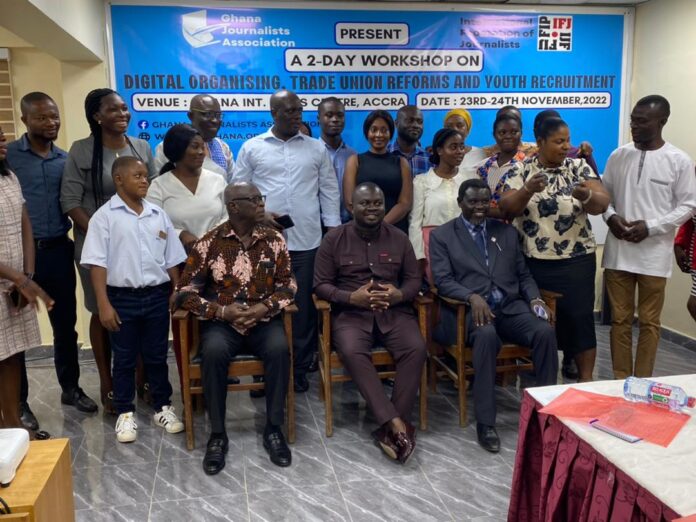The Director of the International Federation of Journalists (IFJ) Africa Secretariat, Dakar, Mr. Palouis Thomasi, has called for the unionization of journalists, especially those working with digital media here in Ghana.
That, he said will help the journalists out of exploitations by anti–trade union advocates while their challenges can be addressed by the unions.
Mr Thomasi made the remarks at a seminar organised for some journalists by the Ghana Journalists Association (GJA), in collaboration with the International Federation of Journalists (IFJ), at the International Press Centre in Accra.
Read Also: GJA, IFJ hold seminar on ‘Digital Organising, Trade Union Reforms’ for journalists
Speaking at the opening of the seminar, he said while it is evident that in most countries in Europe and America “journalists are again rushing to unionize”, their colleagues working in the digital media, journalists in Africa on the contrary especially young journalists who work online and their colleagues in the conventional media continue to shy away from the unions with the wrong notion that joining a union will threaten their chances of promotion, or job opportunities.
He said the deliberate will of certain employers not to give contacts to their workers, poor wages, lack of social security benefits, equal pay for equal work, long hours of work and failure to pay overtime work, unpaid leave or deliberate refusal to allow workers to go on leave, job insecurity and other forms of exploitation are still rampant in the media industry as a whole.
Despite these colossal challenges, Mr Thomasi said the majority of journalists in every African continent are not unionized, mostly due to fear of reprisals from their employers and secondly ignorance on the benefits one gains from being a union member.
At the same, he said most of the unions in the continent lack the capacity and strategy to organize journalists in the digital sector where the majority of workers are not only very young, but most of them have remained “faceless” or invincible.
Mr Thomasi noted that the 2016 IFJ Global Survey revealed that “Digital and online journalism was the fastest area of growth which also attracts many young practitioners who have the digital skills required.
However, he said TV, newspapers and local community radio also report growth in the past decade in different regions, adding that much of the growth though particular in the digital media is poorly paid and based on highly precarious conditions”.
Mr Thomasi said concerning the African region in particular, the Survey revealed that the biggest obstacles in recruiting young journalists are: 29% : journalists do not think unions can help them27% : journalists are not interested26% : journalists fear that union membership may damage job prospects.
He said the Survey interestingly noted that Africa reported the second highest growth with 80% of unions reporting an increase in the numbers of journalists in the industry over the last decade; Africa also recorded the highest percentage of freelance members at 37.5% significantly ahead of second placed Europe at 25%.
He said Africa also recorded the youngest average membership age with only 10% of members over 51 years compared to Asia (17%) or the oldest, Latin America at 51% of members over 51.
In terms of gender, he said African unions have the fourth highest representation of women in membership, with 35% women in membership, below Oceania (49%), Europe (45%), and Latin America (44%), but ahead of North Asia (23%), and South Asia (10%).
“Thus, the objective of this workshop is to:’strengthen our affiliate, GJA, to be able to reform and adapt to the changing economic structures of the media and information sector’, by developing recruitment strategies that will specifically target young journalists working online, as well as engaging young journalists as the Associations’ ambassadors to recruit their peers into the GJA. Today, in most African countries, the majority of our journalists and media workers especially those working on digital media are not unionized,” he said.
“African journalists’ unions must therefore revisit their strategies by conducting research on the needs and aspirations of young journalists in particular if our unions are to successfully adapt and attract future generations,” he continued.
Mr. Palouis Thomasi added, “We must be able to convince the majority of the young journalists coming into the profession that unions and trade unionism in general are still relevant and can help defend their rights and welfare, as well as improving their working conditions.”
He said,”As trade unionists, we must strongly express that joining a union of your choice does not damage your career prospects.”
He again said,”As journalists and trade unionists we must continue to strive to eradicate the negative notions labeled against trade unionism by the anti – trade union advocates whose only interest is to maximize profit by paying starvation wages and exploiting journalists and media worker. We must all come together and organize in order to put an end to this vicious cycle of exploitation.”
Ghana|Atinkaonline.com| Porcia Oforiwaa Ofori

























